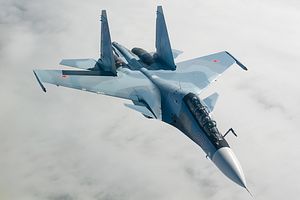Russia does not think that the United States’ decision to end a decades-old ban on the sales of arms to Vietnam will significantly affect Russian military exports to the Southeast Asian country, according to a high-ranking Russian defense official, speaking to TASS news agency this week.
“Our relations with Vietnam are of a strategic character and their further development will depend on the leadership of Vietnam. I think that this (lifting embargo) will not affect the export of Russian weapons,” Anatoly Punchuk, the deputy head of Russia’s Federal Service for Military-Technical Cooperation (FSVTS), said Monday.
U.S. President Barack Obama announced earlier today that the United States would fully lift the ban on military exports. “The United States is fully lifting the ban on the sale of military equipment to Vietnam that has been in place for some 50 years,” Obama said at a news conference in Hanoi with Vietnamese President Tran Dai Quang.
The United States had already partially lifted the embargo in October 2014 for “maritime security-related defense articles,” as The Diplomat reported. As a result Vietnam purchased six U.S.-made Metal Shark Defiant 75 patrol vessels for its Coast Guard for which the United States provided $18 million in loans.
A further illustration of deepening U.S.-Vietnamese defense ties is the United States Army’s plan to set up equipment depots containing equipment for humanitarian and disaster relief operations in the country, as I reported previously. This would entail a de facto small permanent presence of U.S. Army personnel in Vietnam.
Russia, however, remains the country’s most important long-time partner in the field of bilateral military-technical cooperation, although the relationship is not entirely frictionless. Still, the majority of Vietnamese military hardware is Russian and Russia continues to provide military training to all of Vietnam’s military services.
Among a host of Soviet-era legacy platforms, Vietnam’s People’s Air Force currently operates 32 Russian-made Su-30MK2 fighter aircraft and is expecting delivery of four more jets by the end of 2016. Vietnam is purportedly also interested in acquiring a squadron of Sukhoi Su-35S multirole fighter jets (See: “Will Vietnam Buy a Squadron of Russian Su-35 Fighter Jets?”).
Vietnam has also recently acquired advanced anti-ship and land-attack missiles from Russia for its six Russian-made 4,000-ton Type 636 Kilo-class diesel-electric submarines (five of which have been delivered so far). Additionally, Vietnam’s People’s Navy (VPN) is planning to expand the number of Project 1166 Gepard-class frigates from two to six by 2017. Furthermore, the VPN operates Svetlyak-class fast patrol boats, Molniya-class guided missile corvettes built with Russian assistance, and a number of other frigates and corvettes of Russian origin.
The majority of artillery, armored personnel carriers, tanks, and helicopters in the People’s Army of Vietnam is also of Russian origin. Russia also maintains a small military presence in the Southeast Asian country, which has been more noticeable of late.
As The Diplomat reported previously, in March, Russian Tu-95MS Bear nuclear-capable strategic bombers had been refueled by Russian Il-78 tanker aircraft stationed at a military airfield at Cam Ranh Bay on Vietnam’s central coast, while conducting a patrol in the airspace near Guam.
The lifting of the arms embargo will, in all likelihood, have limited impact in expanding the military capabilities of the Vietnamese military and not affect Russian defense exports in the near term.
However, the lifting of the weapons sale ban will have a number of important political and strategic implications as my colleague, Prashanth Parameswaran, pointed out, some of which could have a negative long-term impact on Russian-Vietnamese defense ties.

































